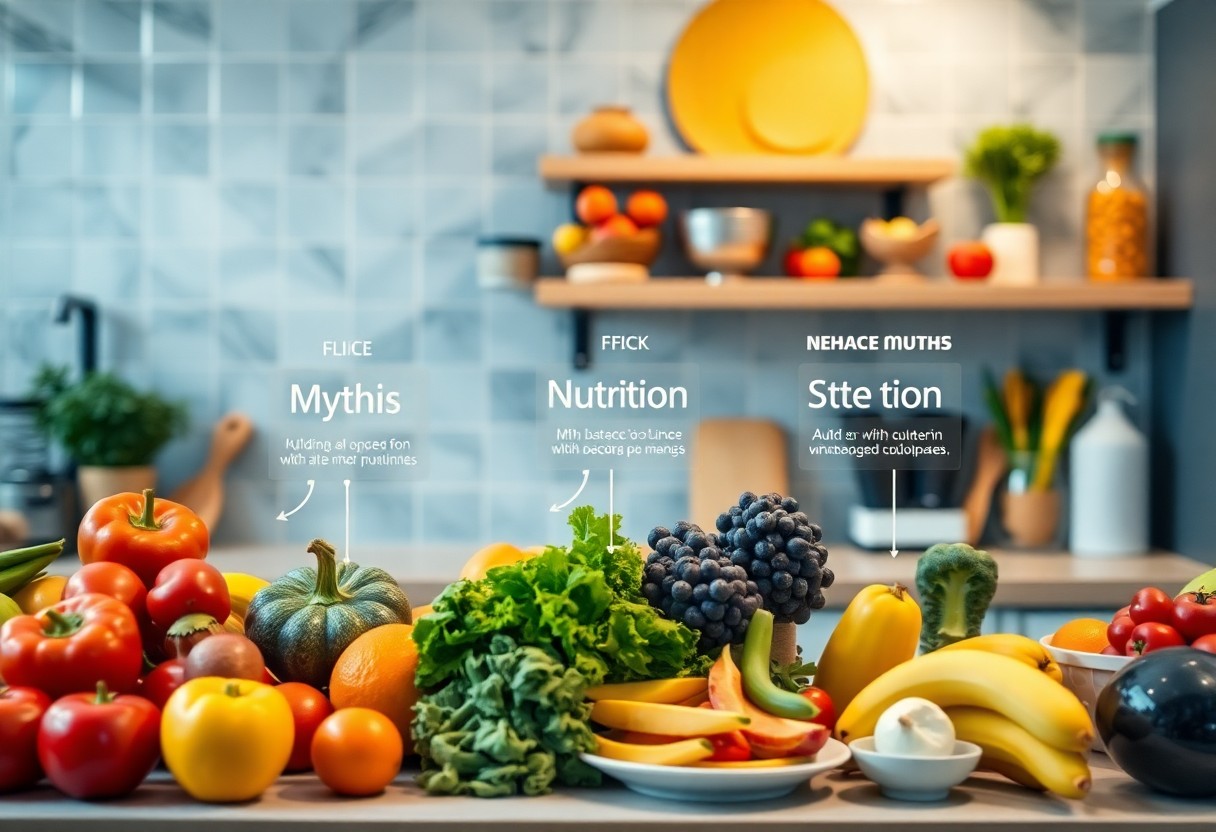With so much information available, it’s easy to get confused about what’s true and what’s not when it comes to nutrition. You may have heard different opinions on diets, superfoods, and other health tips. This blog post will help you uncover the truth behind the biggest nutrition myths. By understanding these misconceptions, you can make better choices for your health and wellness. Let’s look into these myths and set the record straight!
Key Takeaways:
- Not all fats are bad; healthy fats like those found in avocados and nuts are important for your body.
- Carbs are not the enemy; whole grains and fruits are important for energy and overall health.
- Supplements can help, but a balanced diet with real food is usually more effective for getting the nutrients you need.
Myth 1: Carbs Make You Fat
While many people believe that carbohydrates lead to weight gain, the truth is more complex. Carbs are not the enemy; rather, it’s the type and quantity of carbs that matter. When you consume more calories than your body needs, regardless of the source, you can gain weight. Understanding this can help you make more informed choices about your diet.
Understanding Carbohydrates
An important part of your diet, carbohydrates are the body’s primary source of energy. They come in three forms: sugars, starches, and fiber. Not all carbs are equal; some are healthy and necessary for your body’s functions, while others can contribute to weight gain when overconsumed.
The Role of Carbs in Your Diet
On the contrary to popular belief, carbohydrates serve important functions in your diet. They provide energy for your daily activities and are vital for brain function. Including whole grains, fruits, and vegetables in your meals can help you feel full and satisfied, making it easier to maintain a healthy weight.
Hence, when you choose the right types of carbs, such as whole grains, fruits, and vegetables, you gain numerous health benefits. These foods contain vitamins, minerals, and fiber, which support your overall well-being. Rather than cutting out carbs, focus on moderation and the quality of the carbohydrates you eat to stay healthy and energized.

Myth 2: You Need to Avoid All Fats
Assuming you think all fats are bad, it’s time to change your mindset. Not all fats are created equal. In fact, your body needs certain fats to function properly. Completely avoiding fats can lead to nutrient deficiencies and may even harm your health. The key is to choose healthy fats while limiting unhealthy ones.
Good Fats vs. Bad Fats
Among the many types of fats, there are good fats and bad fats. Good fats, like those found in avocados, nuts, and olive oil, help improve heart health and support brain function. In contrast, bad fats, such as trans fats found in processed foods, can increase the risk of heart disease. Choosing the right fats is crucial for your overall well-being.
The Importance of Healthy Fats
Fats play an important role in your diet. They help your body absorb vitamins and support cell growth. Healthy fats also provide energy and can reduce inflammation. By including sources of healthy fats in your meals, you can improve your body’s functions and maintain better health.
Myth has it that all fats are harmful, but that’s not true. Healthy fats are necessary for many bodily functions. They can also help you feel fuller for longer, which can aid in weight management. Including good fats in your meals can enhance your diet without adding excess calories. So, don’t shy away from fats. Instead, embrace the beneficial ones for a healthier lifestyle.

Myth 3: Skipping Meals Helps with Weight Loss
To many people, skipping meals seems like an easy way to lose weight. However, this approach can actually backfire. When you skip meals, your body can go into ‘starvation mode,’ slowing down your metabolism. This means that instead of burning calories efficiently, your body clings to every calorie you consume. This can lead to cravings and overeating later on, making it harder to achieve your weight loss goals.
The Impact of Meal Skipping
One common consequence of skipping meals is increased hunger. When you go too long without eating, you may find yourself craving unhealthy snacks or larger portions at your next meal. This behavior can lead to consuming more calories overall, which counters your weight loss efforts.
Importance of Balanced Meals
Against popular belief, eating regular, balanced meals supports your weight loss journey. By providing your body with the right nutrients, you keep your energy levels stable and prevent hunger spikes. Balanced meals should include a mix of protein, healthy fats, and whole grains, making it easier to manage your appetite.
Further, by maintaining a regular eating schedule, you help regulate your blood sugar levels. This can reduce cravings and the likelihood of overeating. Including a variety of foods in your meals also ensures that your body gets the vitamins and minerals it needs. Ultimately, making informed choices about your meals can lead to sustainable weight loss without the stress of skipping meals.

Myth 4: Eating Late at Night Causes Weight Gain
Once again, it’s time to bust a popular myth! Many people believe that eating late at night leads to weight gain. However, this belief is not as clear-cut as it seems. According to nutrition experts, it’s more about what you eat rather than when you eat it. For more details, check out this article on 10 Nutrition Myths Experts Wish Would Die.
The Truth About Meal Timing
About meal timing, research shows that consuming calories at night doesn’t automatically result in weight gain. Your total daily calorie intake matters most. So, if you eat a balanced dinner and stay within your daily needs, late-night munching may not harm your waistline.
It’s About What You Eat, Not When
With this perspective, it becomes clear that nutrition should focus on food quality. For example, opting for healthy snacks, like fruits or nuts, can be part of a balanced diet even in the evening. On the other hand, indulging in sugary or fatty foods late at night could contribute to weight gain, regardless of the time you eat.
Gain insight from this context: your overall diet plays a bigger role than the clock. If you choose nutritious foods and pay attention to portion sizes, you can enjoy late-night meals without worrying about weight gain. Make smart choices, and remember that balance is key to a healthy lifestyle.
Myth 5: Protein Supplements Are Necessary for Everyone
All you really need to know is that protein supplements are not imperative for everyone. Many people believe that protein powders are the best way to build muscle or lose weight. However, most individuals can meet their protein needs through whole foods alone. Instead of relying on supplements, you can focus on eating a balanced diet that includes a variety of protein-rich foods.
Natural Protein Sources
To get enough protein in your diet, consider foods like chicken, fish, eggs, beans, and nuts. These natural sources not only provide protein but also offer other important nutrients such as vitamins and minerals. For example, a 3-ounce serving of chicken has about 25 grams of protein. By including these foods in your meals, you can easily meet your nutritional needs without needing supplements.
Who Really Needs Supplements?
Supplements are sometimes helpful for specific groups of people. If you are an athlete or have certain dietary restrictions, protein supplements can help. For example, vegans or vegetarians might find it hard to get enough protein from food alone. In these cases, protein powders can be a useful addition to your diet.
At times, medical conditions or lifestyle choices can also mean you need extra protein. If you’re recovering from surgery or illness, you may need more protein to heal. It’s imperative to consult a healthcare provider to determine if you truly need supplements. They can provide personalized advice based on your specific needs and lifestyle.
Myth 6: Sugar is Always Bad
Now, it’s common to hear that all sugar is harmful. However, not all sugar is created equal. Your body does need some sugar for energy. The real issue arises when people consume too much sugar, especially added sugars. This can lead to weight gain and health problems. But, you can enjoy sugar in moderation. Understanding the types of sugar is important for making better choices.
Different Types of Sugar
An easy way to understand sugar is to look at the different types. Here’s a breakdown:
| Type of Sugar | Source |
| Natural Sugar | Fruits, vegetables, and dairy |
| Added Sugar | Processed foods and sugary drinks |
| Refined Sugar | Cane or beet sugar |
| Brown Sugar | White sugar mixed with molasses |
| Honey | Natural sweetener from bees |
- Natural sugars are found in whole foods.
- Added sugars are often found in snacks and sweets.
- Refined sugars have been processed and provide empty calories.
- Brown sugar can be less processed.
- Honey has some nutrients but is still a form of sugar.
Perceiving sugar types can help you make healthier choices.
Moderation is Key
Around your diet, moderation plays a vital role. It’s okay to include sugar, but you should do it wisely. Focus more on natural sugars from fruits and limit added sugars found in snacks and sodas. This balance helps you enjoy treats without overdoing it on sugar.
Plus, paying attention to portion sizes can make a big difference. You don’t need to cut out sweets completely. Instead, enjoy them in smaller amounts. This way, you can maintain a healthier lifestyle while still satisfying your sweet tooth. When you balance your intake and make smart choices, you can enjoy sugar without the negative effects.
In closing, acknowledging the different types of sugar and practicing moderation is imperative. You can surely enjoy sweets while looking after your health.
Final Words
Following this guide, you can better navigate the world of nutrition and avoid common myths. Understanding the truth about food can help you make healthier choices. You don’t need to believe everything you hear about diets and nutrition. Trust evidence-based information instead. By focusing on balanced meals and being mindful of what you eat, you can boost your health and well-being. Keep questioning and learning to empower your nutritional journey.
FAQ: Debunking the Biggest Nutrition Myths of All Time
Q1: Is eating fat bad for you?
A: Eating fat is not bad for you. In fact, healthy fats, like those found in avocados, nuts, and olive oil, are important for your overall health. They can help your body absorb vitamins and keep your heart healthy. What matters is the type of fat you consume. Avoid trans fats and limit saturated fats, but include healthy fats in your diet.
Q2: Do carbs make you gain weight?
A: Carbohydrates themselves do not directly cause weight gain. Weight gain happens when you consume more calories than you burn, regardless of the source. Carbs provide energy for your body. Choose whole grains, fruits, and vegetables as healthy sources of carbohydrates. These foods are better than refined carbs like sugary snacks and drinks.
Q3: Should I avoid all sugar?
A: You don’t have to avoid all sugar. Natural sugars found in fruits and dairy come with nutrients your body needs. However, it’s best to limit added sugars found in processed foods and sugary drinks. Too much added sugar can lead to health issues, including obesity and diabetes.
Q4: Are all supplements necessary for good health?
A: Not all supplements are necessary. A balanced diet can provide most of the nutrients your body needs. However, some people may benefit from supplements, especially if they have certain dietary restrictions. It’s a good idea to talk to a healthcare professional before starting any supplement to see if it’s right for you.
Q5: Does eating late at night make you gain weight?
A: Eating late at night doesn’t automatically make you gain weight. What matters is your total calorie intake for the day. If you eat a healthy snack at night and stay within your calorie needs, it won’t cause weight gain. Focus on what you eat throughout the day rather than the time you eat.
Key Takeaways
- Healthy fats are important; avoid unhealthy fats.
- Carbs are not the enemy; choose whole foods over refined ones.
- Natural sugars are fine; limit added sugars.
- Supplements are not always needed; consult a professional.
- Meal timing isn’t as important as total calorie intake.
Understanding nutrition is important for leading a healthy life. By debunking these myths, you can make more informed decisions about your diet. Always prioritize whole foods and consult experts when in doubt.




